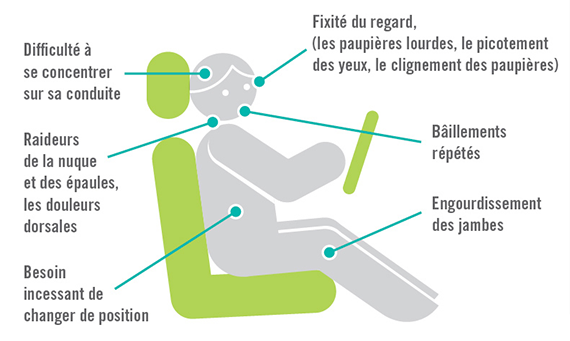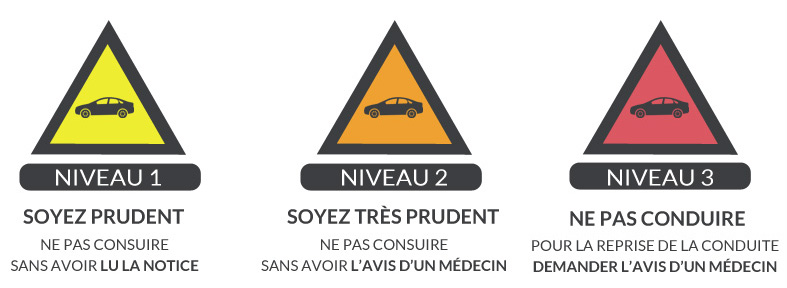Against fatigue at the wheel, only one solution: the break.
Fatigue and drowsiness at the wheel are the cause of one in three fatal accidents.
They remain the leading causes of death on the highway.
At the wheel, you can't fight against fatigue and sleep: no miracle, the only remedy is to take a break.
Detecting the main signs of fatigue and drowsiness

- Difficulty concentrating on driving,
- Staring,
- Heavy eyelids, tingling eyes, repeated blinking,
- Repeated yawning,
- Incessant need to change position,
- Pain and stiffness in the neck, shoulders and back,
- Numbness in the legs.
If you feel any of these signs: you need to stop and take a break!
This is the only time to recover the attention and concentration needed for driving.
To prevent falling asleep, take a break every 2 hours... maximum!
It's generally said that you should stop every 2 hours, but that's the minimum: it's safer to say that you should take a break as soon as you feel the first signs of tiredness, even if you only have a few kilometres to go.
At the first signs of fatigue, stopping at a rest area for a 15-minute sleep break or changing drivers will allow you to continue your journey in complete safety.
What is a successful break?
Stop in a calm and quiet place, during these 15 to 20 minutes you should stop everything, get into a comfortable position and, above all, plan to be woken up. After the break, hydrate, air out the car, relax and you're ready to go again.
Drowsiness and tiredness during long holiday journeys
1 in 2 drivers reduce their usual sleep time when they leave on holiday, to bring forward the departure time or prepare the vehicle for loading. The driver then leaves with a sleep debt.
To avoid drowsiness at the wheel: you need to start off well rested!
Don't take unnecessary risks by driving tired.
- Give yourself a good night's sleep the night before you leave.
- Avoid leaving after a tiring day's work.
- Take a nap (maximum 1.5 hours).
Good to know!
You can fall asleep at any time of the day, but there are 2 high-risk periods when you need to pay particular attention: between 2 and 5 a.m., when your biological clock tells you to go to sleep, and mid-day, whether you've had breakfast or not.
Certain factors increase the risk of tiredness and drowsiness
- Medicines:
Some medicines affect alertness. You should discuss this with your doctor and look at the pictograms on medicine boxes:

- Sleep debt:
It sets in when you don't get enough sleep over several days. At the start of the week, you go to bed late and get up early. You then fall behind, and it's at the end of the week that the risk of falling asleep at the wheel is greatest.
It can also stem from a deeper cause such as sleep apnea, if you are affected by snoring, headaches on waking... Don't hesitate to consult your doctor.
-
Alcohol:
Alcohol affects alertness. Alcohol relaxes you and alters your perception of the environment. Because of this relaxation, you can fall asleep with just a glass. Especially when combined with sleep deprivation.
- A heavy or very copious meal:
Eating a lot of food and fat increases the risk of drowsiness, as the energy required for digestion impairs the concentration needed for driving. Before hitting the road, it's best to eat lightly and take advantage of regular breaks to recharge your batteries.
- Lack of ventilation:
Lack of ventilation causes drowsiness, and too high a concentration of CO2 is bad for driving, accompanied by excessive heat or cold, which is conducive to falling asleep. Remember to ventilate your vehicle well before setting off and at every stop.
A few preconceived ideas...
- Fatigue and drowsiness at the wheel only occur on long distances.
All drivers are affected, even on short journeys of less than 2 hours. Fatigue is responsible for 1 in 3 accidents on the motorway, and half of these occur on journeys of less than 2 hours. And particularly just before arriving. That's often when we get drowsy.
Sleep doesn't care about distance. The risk of drowsiness is particularly high on everyday journeys: 50% of accidents occur on journeys of less than 100 km!
-
Drinking coffee or energy drinks prevents drowsiness.
Drinking coffee gives you a little boost at the time, but it's a false friend: it's always followed by a feeling of tiredness. The same applies to energy drinks.
- Playing the car radio at full volume and opening the window prevent you from falling asleep.
Opening the window, playing the radio at maximum volume and slapping yourself in the face don't work. You're going to fall asleep anyway. The only solution is to stop and take a break.
